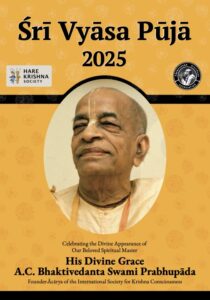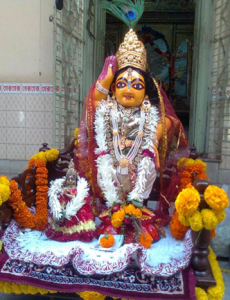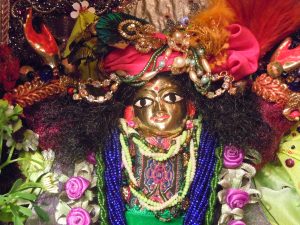SB 7th canto Chapter 14-Instructions for civilized human beings
SB 7.14.36-The entire universe, which is full of living entities, is like a tree whose root is the Supreme Personality of Godhead, Acyuta [Kṛṣṇa]. Therefore simply by worshiping Lord Kṛṣṇa one can worship all living entities.
PURPORT…people are very much anxious to give service to other living entities, especially to the poor, but although they have manufactured many ways to give such help, actually they are expert in killing the poor living entities. This sort of service or mercy is not recommended in the Vedic wisdom. As stated in a previous verse, it has been decided (niruktam) by expert saintly persons that Kṛṣṇa is the root of everything and that worshiping Kṛṣṇa is worshiping everyone, just as supplying water to the root of a tree means satisfying all of its branches and twigs.
SB 7.14.37 purport…The living entity, who is part and parcel of the Supreme Personality of Godhead, exists on the mercy of the Lord, who is always with him in any form of body. The living entity desires a particular type of material enjoyment, and thus the Lord supplies him with a body, which is like a machine. Just to keep him alive in that body, the Lord remains with him as the puruṣa (Kṣīrodakaśāyī Viṣṇu). This is also confirmed in Brahma-saṁhitā (5.35):
SB 7.14.38 purport….In Bhagavad-gītā (15.15) it is said, mattaḥ smṛtir jñānam apohanaṁ ca: the Supreme Personality of Godhead in His localized aspect gives intelligence to the individual soul as far as he is able to grasp it. Therefore we find the individual soul in different high and low positions. …In human society, the perfect brāhmaṇa is supposed to be the most advanced in spiritual consciousness, and further advanced than the brāhmaṇa is the Vaiṣṇava. Therefore the best persons are the Vaiṣṇavas and Viṣṇu. When charity is to be given, one should take instruction from Bhagavad-gītā (17.20):
“That gift which is given out of duty, at the proper time and place, to a worthy person, and without expectation of return, is considered to be charity in the mode of goodness.” One should give charity to the brāhmaṇas and Vaiṣṇavas, for thus the Supreme Personality of Godhead will be worshiped.
SB 7.14.39-My dear King, when great sages and saintly persons saw mutually disrespectful dealings at the beginning of Tretā-yuga, Deity worship in the temple was introduced with all paraphernalia.
Purport…When great saintly persons saw this contamination, they introduced worship of the Deity in the temple. This began in Tretā-yuga and was especially prominent in Dvāpara-yuga (dvāpare paricaryāyāṁ). But in Kali-yuga, worship of the Deity is being neglected. Therefore chanting of the Hare Kṛṣṇa mantra is more powerful than Deity worship. Śrī Caitanya Mahāprabhu set a practical example in that He did not establish any temples or Deities, but He profusely introduced the saṅkīrtana movement. Therefore Kṛṣṇa consciousness preachers should give more stress to the saṅkīrtana movement, especially by distributing transcendental literature more and more. This helps the saṅkīrtana movement. Whenever there is a possibility to worship the Deity, we may establish many centers, but generally we should give more stress to the distribution of transcendental literature, for this will be more effective in converting people to Kṛṣṇa consciousness.
It is said in Śrīmad-Bhāgavatam (11.2.47):arcāyām eva haraye pūjāṁ yaḥ śraddhayehate
na tad-bhakteṣu cānyeṣu sa bhaktaḥ prākṛtaḥ smṛtaḥ
“A person who is very faithfully engaged in the worship of the Deity in the temple but does not know how to behave toward devotees or people in general is called a prākṛta-bhakta, or kaniṣṭha-adhikārī.” A prākṛta devotee, or neophyte devotee, is still on the material platform.
He certainly engages in worshiping the Deity, but he cannot appreciate the activities of a pure devotee. It has actually been seen that even an authorized devotee who is engaged in the service of the Lord by preaching the mission of Kṛṣṇa consciousness is sometimes criticized by neophyte devotees. Such neophytes are described by Viśvanātha Cakravartī Ṭhākura: sarva-prāṇi-sammānanāsamarthānām avajñā spardhādimatāṁ tu bhagavat-pratimaiva pātram ity āha. For those who cannot properly appreciate the activities of authorized devotees, Deity worship is the only way for spiritual advancement. In the Caitanya-caritāmṛta (Antya 7.11) it is clearly said, kṛṣṇa-śakti vinā nahe tāra pravartana: without being authorized by Kṛṣṇa, one cannot preach the holy name of the Lord throughout the entire world. Nevertheless, a devotee who does so is criticized by neophyte devotees, kaniṣṭha-adhikārīs, who are on the lower stages of devotional service. For them, Deity worship is strongly recommended.
SB 7.14.40-Sometimes a neophyte devotee offers all the paraphernalia for worshiping the Lord, and he factually worships the Lord as the Deity, but because he is envious of the authorized devotees of Lord Viṣṇu, the Lord is never satisfied with his devotional service.
PURPORT-Deity worship is especially meant for purifying the neophyte devotees. Actually, however, preaching is more important. In Bhagavad-gītā (18.69) it is said, na ca tasmān manuṣyeṣu kaścin me priya-kṛttamaḥ: if one wants to be recognized by the Supreme Personality of Godhead, he must preach the glories of the Lord. One who worships the Deity must therefore be extremely respectful to preachers; otherwise simply worshiping the Deity will keep one in the lower stage of devotion.



